Seen in… May
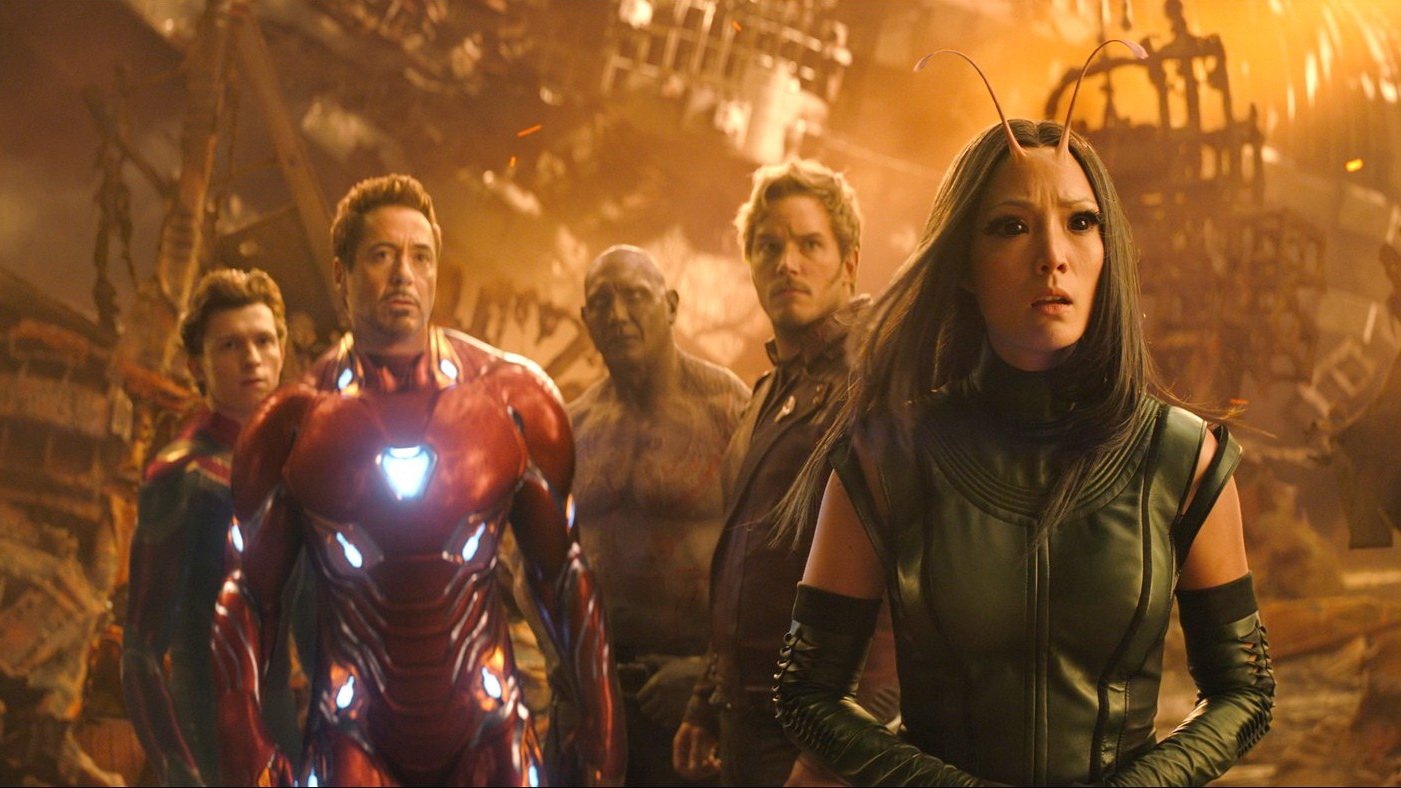
Hey hey, the gang's all here. Image via The Movie DB
A month of crowd-pleasing blockbusters and one worthy Oscar winner. We’ve had such a warm (nay, hot) spring in Toronto that it feels like summer is already here. There’s ice cream to be had, air conditioned theatres to soak in and warm evening bike rides over wet streets to be enjoyed. There’s no denying good movies make summers better. Who am I kidding? Every summer needs some cheesy movies too.
Avengers: Infinity Wars
Almost a decade of Marvel films have alluded to or directly led to this film and its second half coming out next year and in a big way it feels like Marvel is still playing with us. These films have contributed to a culture of not being able to discuss a film without risk of spoilers. How can you talk about a movie when you don’t want to be the bad guy who ruins it for everyone else? Along with television series such as Breaking Bad and Game of Thrones, we’ve all participated in the oddest conspiracy of silence since JFK’s notorious philandering. Yet, I’ll try to give my two bits without giving anything away.
This film begins moments after the film Thor Ragnarok ended only to find Thor, his brother Loki and Hulk defeated by the purple-skinned evil lord of the Universe, Thanos. We then briefly see various members of Earth’s mightiest heroes living their lives; during a stroll in the park, on a school field trip, negotiating a lunch order, when the long missing Bruce Banner appears out of the sky to warn of the approach of Thanos. We learn of Thanos’ desire to complete his magic glove (or gauntlet if you prefer) empowered by the mystical and dangerous Infinity Stones and of his plan to use this power to correct the Universe’s overpopulation problem by simply eradicating half of all living things. This is probably the most radical act of environmental terrorism since Greenpeace scaled an oil rig to erect a flag. Thanos sends a trusted lieutenant, Ebony Maw, to take both the Time Stone and Mind Stones from the Avengers (I’m not going to get into what these stones do or how). Ebony Maw (these names, am I right?) is met with resistance from Iron Man, Spider-man, Dr. Strange, et al. Game on. Sort of. We still spend much of the movie re-assembling the team of supers called the Avengers from all corners of the Earth. From Scotland to Africa the band slowly gets back together for one last gig. Scarlet Witch, Vision, Captain America and Black Panther all team up for the mighty battle that we know is coming. Then it is over, seemingly with a snap of Thanos’ fingers. There are a lot of problems with this movie - mostly that you might pay $15 for yet another set-up to yet another movie. At this point we’ve all put so much in the franchise that we want a pay-off which we still don’t get. Worse yet, despite its own scattered, multi-plot, multi-threaded story line, this movie actually takes time to set up yet another franchise rather than just resolve the story we just watched. And, here’s the spoiler alert, a lot of crucial characters die, but we know they aren’t really gone, because they’ve all been given sequels that have yet to happen. Basically, this movie employs a “Time Stone” that feels like it will be kind of an “instant replay” stone or perhaps a magic Mulligan that will restore all of our heroes just in time to save everyone despite having already lost. What that effectively does is remove the stakes. An action or drama depends on high stakes. Will a couple stay together or ruin a family? Will the heist go off without a hitch or will the thieves go to jail? Will a pilot from a farm save the world or will everyone be killed? Marvel has essentially removed the biggest stake of all: death. When the film ended, the crowd I was with left quietly. Not a peep. No excited talk. No hollers of fun or joy. Just quiet. I don’t think it was the quiet of reverence (such as after the ending of Dunkirk) or of shock at what we just witnessed. It was the shock of a shrug and despite that, the knowledge that we would all plunk down another $15 in a year just to see how it all turned out.
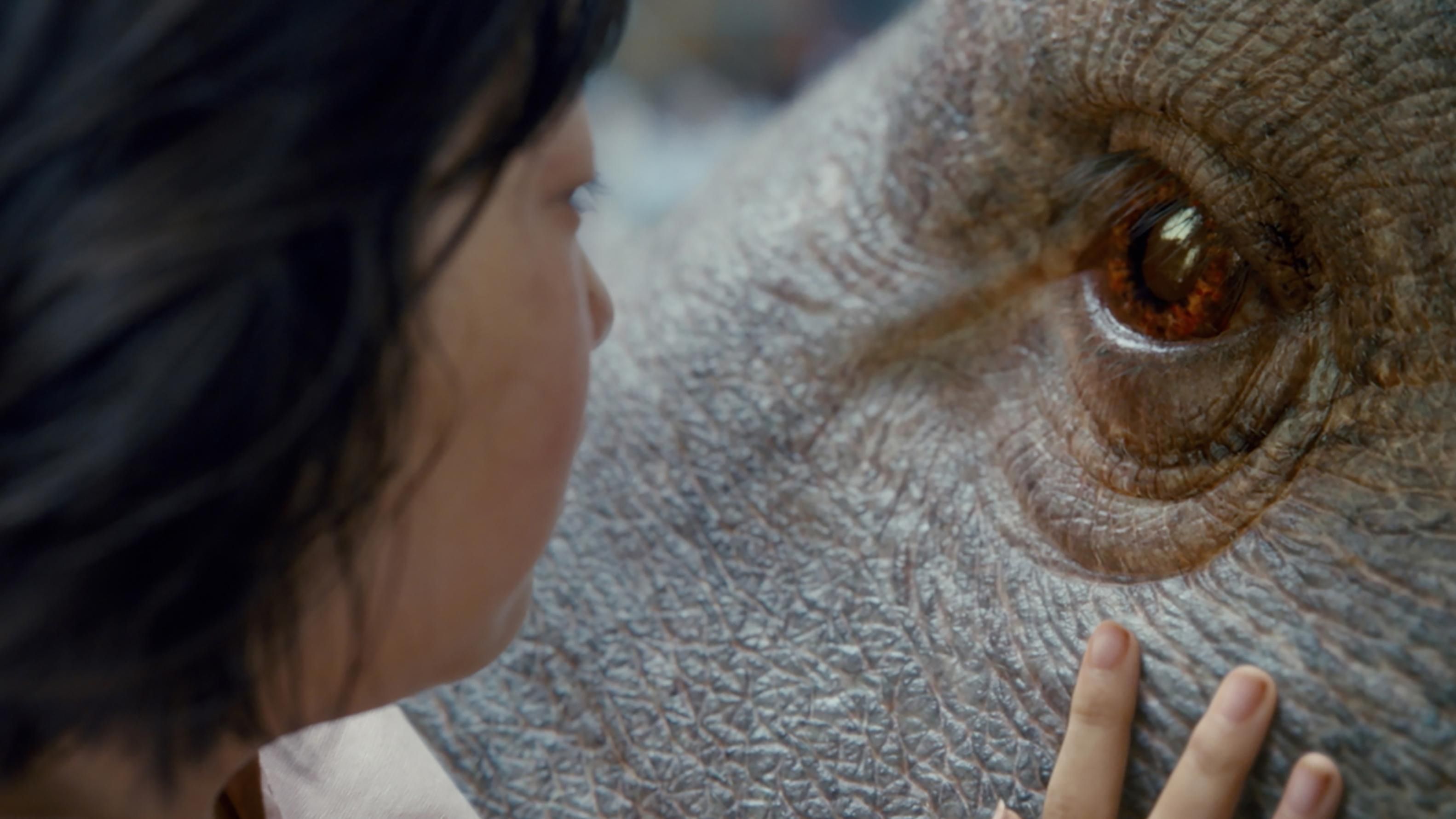
I see you. After all, you are huge. Image via The Movie DB
Okja
Unlike a lot of people, I like Jake Gyllenhaal. I love Tilda Swinton. I really like Korean director Bong Joon-ho who has made some of the smartest films I know. What could go wrong? I like blue cheese, chocolate and bacon but that doesn’t mean they will go well together (or does it? Suddenly I have a hankering for a burger with blue cheese and chocolate dipped bacon!) I’ve said this before, for some reason I’ll accept a talking dog in a movie but if a character is willing to do anything for someone they just met I can’t buy it. Who knows where the mind draws the line of suspension of disbelief but this movie does it in spades. The story is of a giant agro-corp like a Monsato or something that has created a genetically modified pig that grows huge and produces little waste while consuming very little for the sole purpose of solving the world’s food problems. In an international contest the corporation sends 30 pigs to different local farms. Whichever one grows the largest in 10 years, that farmer wins and that pig will be the basis for a generation of other new types of pigs. The only problem is that this is a lie and a publicity stunt and when Okja, the winning animal is taken from her farm, her protective owner, a young girl goes after her, intent on setting her best friend free. The problem for me? My suspension of disbelief was off. We don’t need a giant pig to save us. We have a giant pig. They are called “pigs” and they are a fast growing efficient source of protein. We don’t even need more protein to solve hunger, we just need to get the food we already produce to hungry people. I don’t want to go too much into this except to say the cruelty of the slaughter house scene will give you pause about your meat intake (not because it’s gory but because it’s moving). Unfortunately, Jake Gyllenhaal’s performance was so terrible that not even Tilda Swinton’s (very rare) bad performance could distract you from it. The movie does feel a little like the cast didn’t speak the same language as the director and the director didn’t know what language to talk to the audience (high drama? Camp comedy? Thrilling action?) In the end this film didn’t work for me on a lot of levels despite its ingenuity or sweetness.

The Joneses. Image via The Movie DB
Indiana Jones and the Last Crusade
Harrison Ford as Indiana Jones teams up with Sean Connery as Indy’s dad Prof. Henry Jones to find the holy grail of archaeological treasures: The Holy Grail. This film returned the series to the characters, pacing and scenarios that made the original so much fun. I was surprised to see this film had a lower audience rating than Temple of Doom because, in my mind it really is a better film in every aspect (except that it was missing Karen Allen). The Joneses chase clues and runaway from Nazis throughout Europe and the Middle East in the quest to stop an American Nazi and his Third Reich cohorts from getting their hands on an ancient relic with unbelievable power. To me this is storytelling at its best without any missteps or missing beats. It’s a lesson in filmmaking, editing and scriptwriting all wrapped up in a sumptuous John Williams score. Sure there may be the odd cliché here and there but that’s all part of the fun. Watching this movie won’t solve all of your problems but it will help you forget about them for awhile.
Monty Python’s Meaning of Life
I had no intention of watching this at all. It was on TV and I was about to go to bed and I thought, heck, I’ll just watch this bit… and the next bit and the next bit. When I first saw this film I remember thinking it was a failure because you just can’t sustain your interest in odd little thinly connected skits for 90 minutes. I guess I was wrong. After all this film has such classically quotable lines such as “Oh look, Howard’s being eaten”, and “Would Monsieur care for a wafer thin mint?” It also has some of Monty Python’s best musical numbers such as Every Sperm is Sacred and the Meaning of Life. Where else could you hear a lyric like this:
“Is life just a game where we make up the rules
While searching for something to say
Or are we just simple spiralling coils
Of self-replicating DNA”
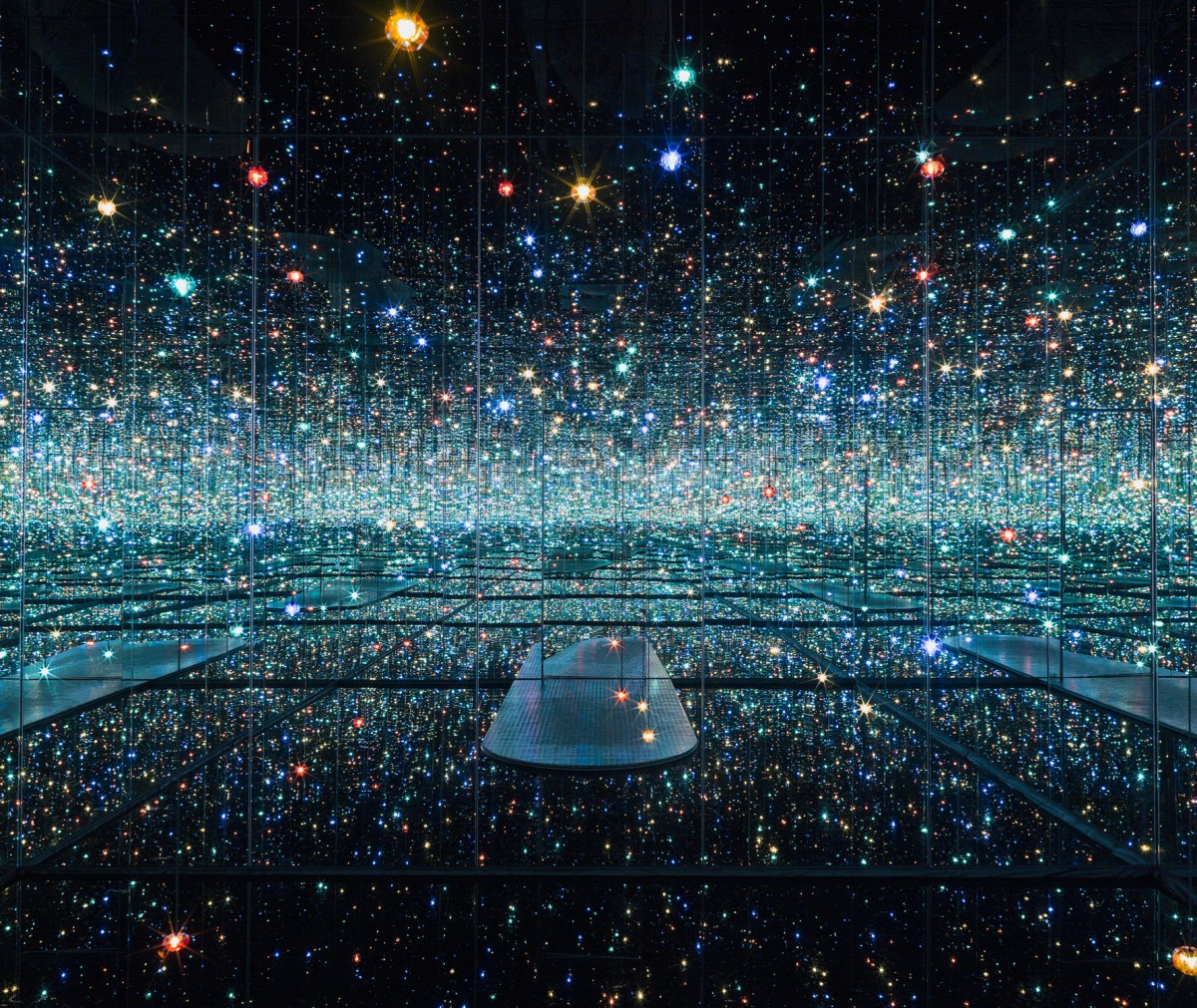
Yayoi Kusama, Infinity Mirrored Room – The Souls of Millions of Light Years Away, 2013. Wood, metal, glass mirrors, plastic, acrylic panel, rubber, LED lighting system, acrylic balls, and water, 287.7 × 415.3 × 415.3 cm. Courtesy of David Zwirner, N.Y. © Yayoi Kusama. Image via The Art Gallery of Ontario
Kusama - Infinity
I never was able to see Yayoi Kusama’s exhibit when it was at the AGO due to demand of the tickets so I decided to see this documentary about her work instead. Kusama is a Japanese artist known for her highly repetitive and intricate patterns of dots and “infinity rooms” which use lighting and mirrors to create incredible effects that play with our sense of depth and visual perception. She was an incredibly talented young artist in Japan who dreamt of a career in art but her wealthy, influential and conservative family frowned upon it. So she headed for the new frontier of New York City where modern art was thriving… mostly for white men. A young Japanese woman was not exactly taken seriously. Despite her prolific and inventive work she seemed to never really find the success or acclaim she deserved. At some point, Kusama, exhausted from constant work and frustrated and exasperated at being passed over began to suffer from depression and anxiety and eventually returned to Japan and sought help for her mental health. The film suggests that as Kusama was tirelessly experimenting with soft sculpture and lighting as sculpture some white guys stole her ideas to find international fame and fortune. This is one part of the film where I think I take umbrage with. There’s no doubt Kusama was poorly treated by the art world probably for being a foreigner and a young woman in a white man’s world but it’s another thing to suggest artists of the stature of Claes Oldenburg or Donald Judd copied her work. It’s especially odd because in both cases we’ve seen a lot of published work showcasing the sketches and experiments that led to the development of their work. In Kusama’s case I think the truth is probably that she was slightly ahead of the curve and rather than continue to explore a form or method she simply moved on to something else. If her youth was marked by endless innovation and obscurity, her senior years have been marked by wild success and critical regard. Kusama has spent her time (still voluntarily institutionalized) obsessively creating dot-themed art and pushing her Infinity Room installations further and further until her work is some of the most popular contemporary art anywhere in the world. Her exhibitions are famously sold out to the point of being difficult to see. Whatever you think of her work it’s hard to argue that she doesn’t have a special vision and talent or that thousands of people lining up to see an art exhibit is a bad thing.

A spread from the original comic, Valerian and Laureline. Image via The Forbidden Planet
Valerian and the City of a Thousand Planets
Luc Besson is a uniquely visual movie director who can create worlds beyond the imagination of most people. Unfortunately his storytelling is less compelling. This is a conundrum. This film is based on a much-loved and highly influential Sci-fi adventure comic book series called Valerian and Laureline. There probably aren’t many directors who could bring such an enormous and visually stunning story to the big screen and clearly this was a labour of love for Besson who has directed such films as La Femme Nikita, Léon: The Professional, Lucy and Fifth Element and despite these films usually looking great, to me they are all a little vapid and even hokey (“love will find a way” kind of hokey). Valerian and Laureline are a pair of special forces operatives tasked with stopping a plot that threatens a gigantic space station city that is sort of a space U.N. Wouldn’t you know it, Valerian and Laureline are both cute as a bug’s ear, are excellent at their jobs and are in love (I think?) They meet many amazing species and carry out many acts of daring-do but in the end it all seems a bit of a waste of time. I feel for Besson in some aspects. I love Jean Giraud’s beautiful and cosmically weird The Gardens of Edena and have often hoped someone would make it come to life as a feature film but after seeing this film, I’m thinking it may be better kept, finely inked with it’s wonderful colours and art, between the pages rather than projected on the big screen.
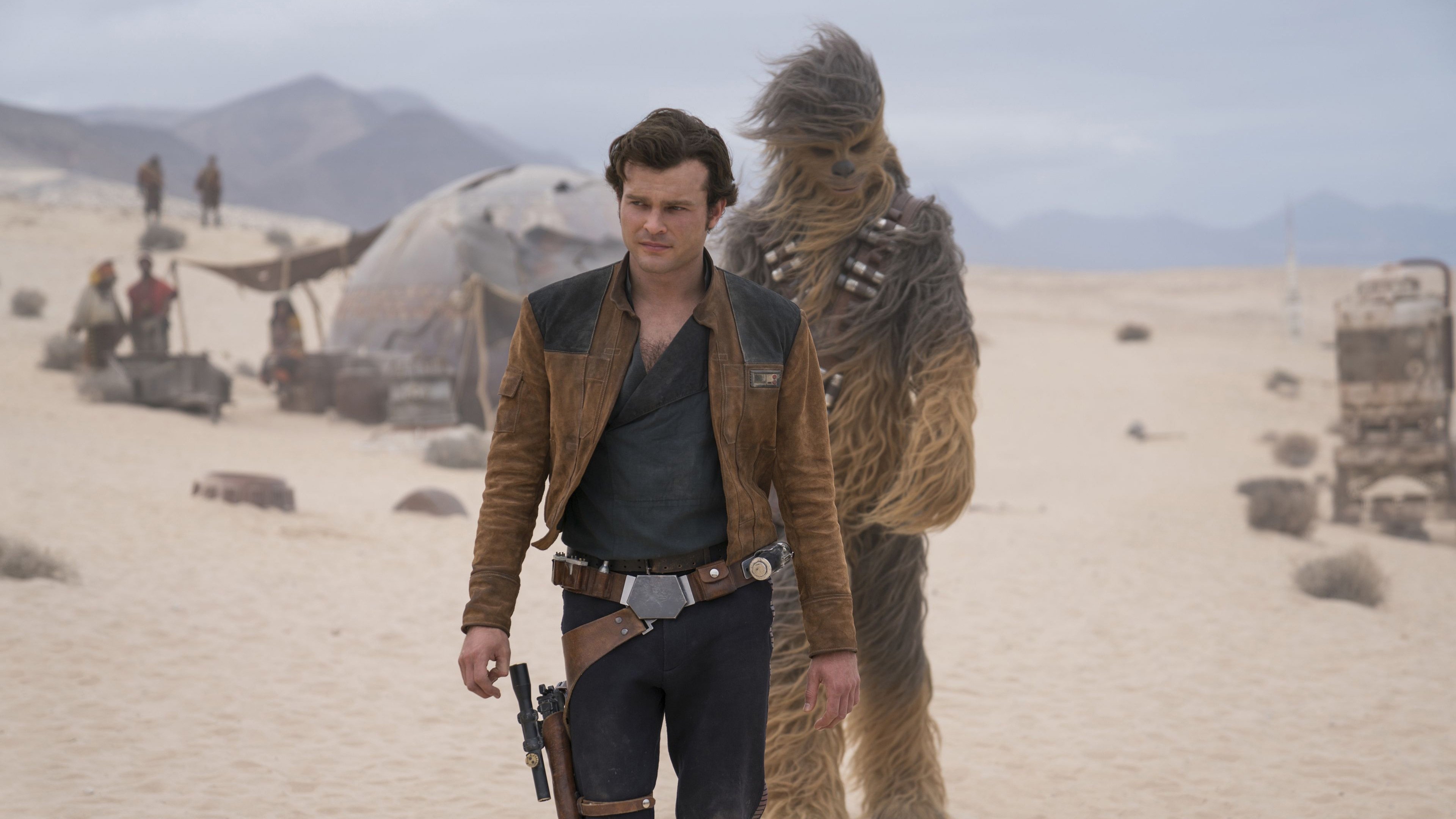
Han and Chewie take in the scenery. Image via The Movie DB
Solo: A Star Wars Story
This stand alone Star Wars movie has been a flop by the very high and successful standards of recent Star Wars films. Some fans hated this interpretation of Han Solo’s back story; where he came from, how he became a smuggler, how he did the Kessel Run in 12 parsecs (rounding down), how he and Chewbacca met and how he came to own his famous ship the Millennium Falcon. I liked it. I liked seeing the cocky young Han Solo, the spirited and decidedly more physical Chewbacca, and particularly meeting a young Lando Calrissian. Donald Glover as Lando and his unusual droid first “mate” L3-37 played by the great British talent Phoebe Waller-Bridge, sort of stole the show. Why couldn’t they get a spin-off movie? Again, the younger, angrier Chewie was also a lot of fun. And this movie is fun, but still… it wasn’t special in that kind of Star Wars way. This movie is a straight up heist movie. The story could have been set in the old West, or in prohibition era Chicago or as a space opera. Star Wars, with its mash up of Samurai and Arthurian mythos, westerns, comic book action and Sci-fi genres mixed with the mysticism of the “Force” has inspired quack pseudo religions and thousands of pages of fan fiction. It is a “special” universe, but this film, as fun as it was, did not really have that specialness. I still thought it was a hoot and better than Rogue One which dragged its feet in its own way but I do get why people (with very little else in their lives) would be disappointed.
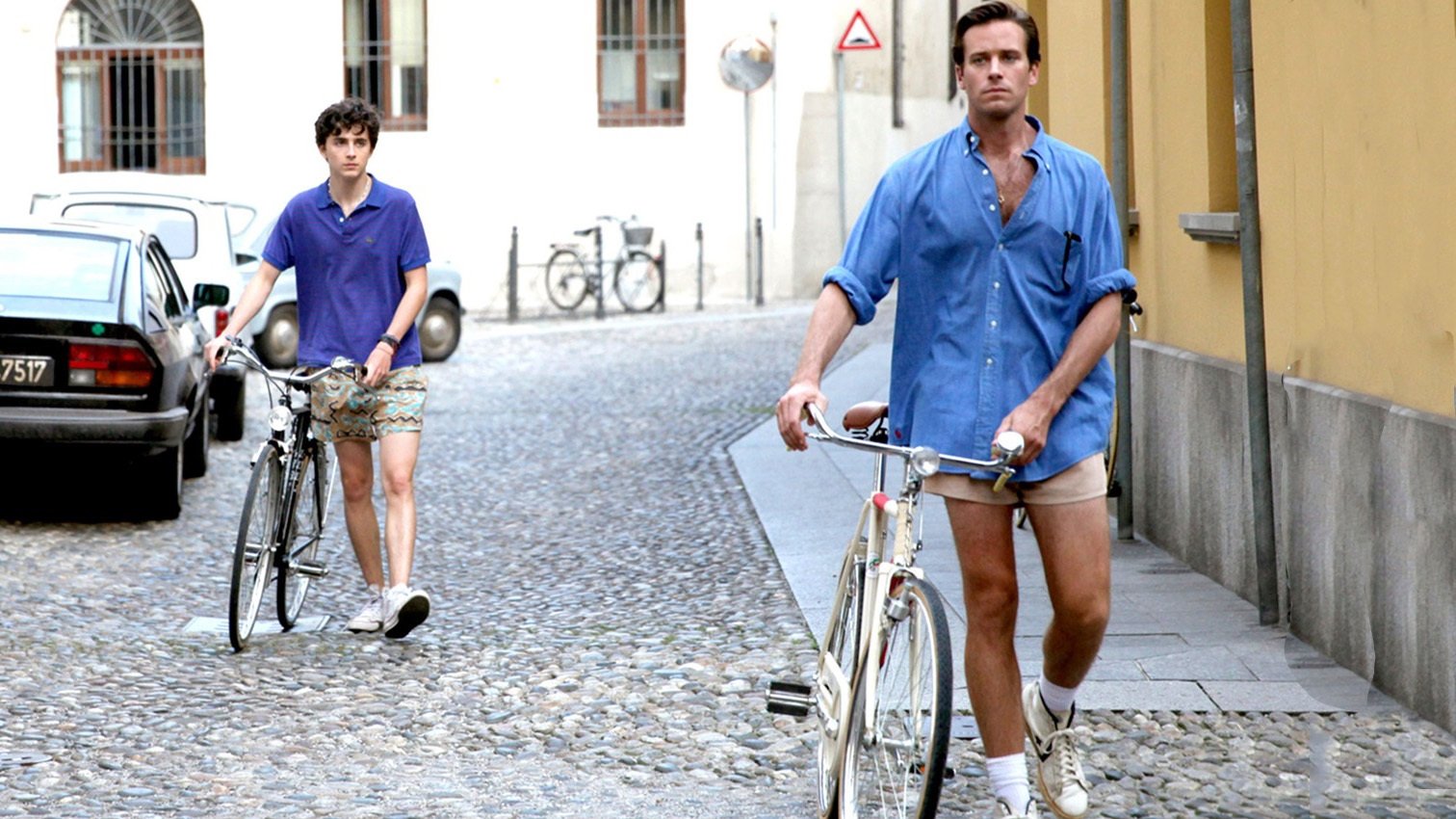
Elio and Ollie. Image via The Movie DB
Call Me By Your Name
Yes, this is a “coming of age/coming out” film. It many ways it follows a familiar pattern. Set in the late 80s, Elio, a handsome teen-ager spending an idyllic summer in an idyllic Italian town becomes intrigued and drawn to an even more handsome grad student, Oliver, working with Elio’s academic professorial father for the summer. Oliver and Elio flit about and flirt throughout volleyball games, morning swims, family meals and day trips until their slowly heating attraction boils over into a tumultuous exploration of love and sexuality. Apparently the Oscar winning screenwriter James Ivory wanted a more explicitly sexual depiction of the affair but I think the director Luca Guadagnino was right to focus on the small intimate moments that make a relationship. The power of it is felt in those delicate touches, removing sensationalism that would undoubtably result from full frontal male nudity which would only distract from the story. Guadagnino is the director of I Am Love, and A Bigger Splash which were both also set against distractedly stunning locales and share the languid boredom of those sublime summer days spent doing nothing other than simply existing. These settings, pacing and dialogue really remind me of some of those classic Éric Rohmer films like La Collectioneuse, Pauline at the Beach and Claire’s Knee (reaaaaallly reminded me of Claire’s Knee). This inherent beauty actually led to some of the criticism of this film - that a very simple story was getting undeserved acclaim because it was so beautifully filmed. Well, um, yeah? That kind of criticism sounds a little like saying you only like that pie because it tastes so good. Perhaps, younger viewers never really needed a film about a young man figuring out his sexuality because that seems very everyday to them. There is a question that if this film were made 30 years ago, there would’ve been a lot more inference, suggestion and implied themes, subtly spoken through subtext, but today we can just show a gay romance without the pretext of subtext - if you know what I mean. I don’t think that is really it though. This film, a little like Lady Bird, and perhaps the opposite of Moonlight is a bit heartbreaking and a bit uplifting at the same time which I suppose is the recipe for “bittersweet”. In any case, Timothée Chalamet’s Oscar nomination was deserved and was most likely based on the film’s final scene as he portrays a heartbroken Elio staring into a fireplace, his face glowing from the flame, overwhelmed with emotions. One of the messages of the movie is to allow yourself to feel something whether good or bad and to hold on to and remember those feelings and I suppose that final drawn out scene lingers with the viewer the way a bitter memory might. Better to have loved and lost etc. On another note, a particular Psychedelic Furs song, Love My Way, plays a meaningful role in the film and that role is to remind me of just how much of the music I listened to in the 80s had gay themes that soared like a mighty eagle far above my head.


0 Comments:
Post a Comment
<< Home